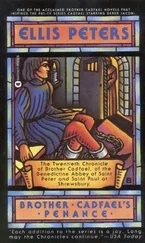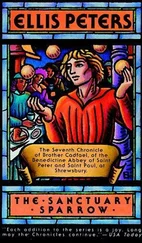Brother Petrus was basting the plump little carcase lovingly with his rich wine sauce, tasting delicately, adding a pinch of rosemary and a mere hint of rue, when Prior Robert swept into the kitchen, imperially tall and papally austere, and stood over the pot, his alabaster nostrils twitching to the tantalising scent, and his cool eyes studying the appearance of the dish, which was as alluring as its savour. Brother Petrus stooped to hide his face, which was sour as gal, and basted industriously, hoping his best efforts might meet with an uninformed palate, and disgust where they should delight. Small hope, Robert had such pleasure in the aroma that he almost considered abandoning his generous plan to share the satisfaction. Almost, but not quite. Mallilie was indeed a desirable property.
“I have heard,” said the prior, “that our guest at the house by the millpond is in poor health, and lacks appetite. Set aside a single portion of this dish, Brother Petrus, and send it to the invalid with my compliments, as an intermissum after the main dish for the day. Bone it, and serve it in one of my own bowls. It should tempt him, if he is out of taste with other foods, and he will appreciate the attention.” He condescended, all too genuinely, to add: “It smells excellent.”
“I do my best,” grated Brother Petrus, almost wishing his best undone.
“So do we all,” acknowledged Robert austerely, “and so we ought.” And he swept out as he had swept in, highly content with himself, his circumstances, and the state of his soul. And Brother Petrus gazed after him from under lowering brows, and snarled at his two lay scullions, who knew better than to meddle too close while he was cooking, but kept the corners of the kitchen, and jumped to obey orders.
Even for Brother Petrus orders were orders. He did as he had been instructed, but after his own fashion, seeing to it that the portion he set aside for the unoffending guest was the choicest part of the flesh, and laced with the richest helping of the sauce.
“Lost his appetite, has he?” he said, after a final tasting, and unable to suppress his satisfaction in his own skills. “That should tempt a man on his death-bed to finish it to the last drop.”
Brother Cadfael on his way to the refectory saw Aelfric crossing the great court from the abbot’s kitchen, heading quickly for the gatehouse, bearing before him a high-rimmed wooden tray laden with covered dishes. Guests enjoyed a more relaxed diet than the brothers, though it did not differ greatly except in the amount of meat, and at this time of year that would already be salt beef. To judge by the aroma that wafted from the tray as it passed, beef boiled with onions, and served with a dish of beans. The small covered bowl balanced on top had a much more appetising smell. Evidently the newcomer was to enjoy an intermissum today, before coming to the apples from the orchard. Aelfric carried his burden, which must be quite heavy, with a careful concentration, bent on getting it safely and quickly to the house by the pond. It was not a long journey, out at the gatehouse, a short step to the left, to the limits of the monastery wall, then past the millpond on the left, and the first house beyond was Aelfric’s destination. Beyond, again, came the bridge over the Severn, and the wall and gate of Shrewsbury. Not far, but far enough in December for food to get cold. No doubt the household, though relieved of the need to do much cooking, had its own fire and hob, and pans and dishes enough, and the fuel was a part of the price of Bonel’s manor.
Cadfael went on to the refectory, and his own dinner, which turned out to be boiled beef and beans, as he had foreseen. No savory intermissum here. Brother Richard, the sub-prior, presided; Prior Robert ate privately in the lodging he already thought of as his own. The partridge was excellent.
They had reached the grace after meat, and were rising from table, when the door flew open almost in Brother Richard’s face, and a lay brother from the porter’s lodge burst in, babbling incoherently for Brother Edmund, but too short of breath from running to explain the need.
“Master Bonel—his serving-maid has come running for help …” He gulped breath deep, and suppressed his panting long enough to get out clearly: “He’s taken terribly ill, she said he looks at death’s door … the mistress begs someone to come to him quickly!”
Brother Edmund gripped him by the arm. “What ails him? Is it a stroke? A convulsion?”
“No, from what the girl said, not that. He ate his dinner, and seemed well and well content, and not a quarter of an hour after he was taken with tingling of the mouth and throat, and then willed to vomit, but could not, and lips and neck are grown stiff and hard… . So she said!”
By the sound of it, she was a good witness, too, thought Cadfael, already making for the door and his workshop at a purposeful trot. “Go before, Edmund, I’ll join you as fast as I may. I’ll bring what may be needed.”
He ran, and Edmund ran, and behind Brother Edmund the messenger scuttled breathlessly towards the gatehouse, and the agitated girl waiting there. Prickling of the lips, mouth and throat, Cadfael was reckoning as he ran, tingling and then rigidity, and urgent need, but little ability, to rid himself of whatever it was he had consumed. And a quarter of an hour since he got it down, more by now, if it was in the dinner he had eaten. It might be late to give him the mustard that would make him sick, but it must be tried. Though surely this was merely an attack of illness from some normal disagreement between an indisposed man and his perfectly wholesome food, nothing else was possible. But then, that prickling of the flesh of mouth and throat, and the stiffness following… that sounded all too like at least one violent illness he had witnessed, which had almost proved fatal; and the cause of that he knew. Hurriedly he snatched from the shelves the preparations he wanted, and ran for the gatehouse.
For all the chill of the December day, the door of the first house beyond the millpond stood wide, and for all the awed quietness that hung about it, a quivering of agitation and confusion seemed to well out at the doorway to meet him, an almost silent panic of fluttering movements and hushed voices. A good house, with three rooms and the kitchen, and a small garden behind, running down to the pond; he knew it well enough, having visited a previous inmate upon less desperate business. The kitchen door faced away from the pond, towards the prospect of Shrewsbury beyond the river, and the north light at this time of day and year made the interior dim, although the window that looked out southwards stood unshuttered to let in light and air upon the brazier that did duty as all the cooking facilities such pensioners needed. He caught the grey gleam of a reflection from the water, as the wind ruffled it; the strip of garden was narrow here, though the house stood well above the water level.
By the open inner door through which the murmur of frightened voices emerged, stood a woman, obviously watching for him, her hands gripped tightly together under her breast, and quivering with tension. She started eagerly towards him as he came in, and then he saw her more clearly; a woman of his own years and his own height, very neat and quiet in her dress, her dark hair laced with silver and braided high on her head, her oval face almost unlined except for the agreeable grooves of good-nature and humour that wrinkled the corners of her dark-brown eyes, and made her full mouth merry and attractive. The merriment was quenched now, she wrung her hands and fawned on him; but attractive she was, even beautiful. She had held her own against the years, all forty-two of them that had come between.
He knew her at once. He had not seen her since they were both seventeen, and affianced, though nobody knew it but themselves, and probably her family would have made short work of the agreement if they had known of it. But he had taken the Cross and sailed for the Holy Land, and for all his vows to return to claim her, with his honours thick upon him, he had forgotten everything in the fever and glamour and peril of a life divided impartially between soldier and sailor, and delayed his coming far too long; and she, for all her pledges to wait for him, had tired at last and succumbed to her parents’ urgings, and married a more stable character, and small blame to her. And he hoped she had been happy. But never, never had he expected to see her here. It was no Bonel, no lord of a northern manor, she had married, but an honest craftsman of Shrewsbury. There was no accounting for her, and no time to wonder.
Читать дальше












